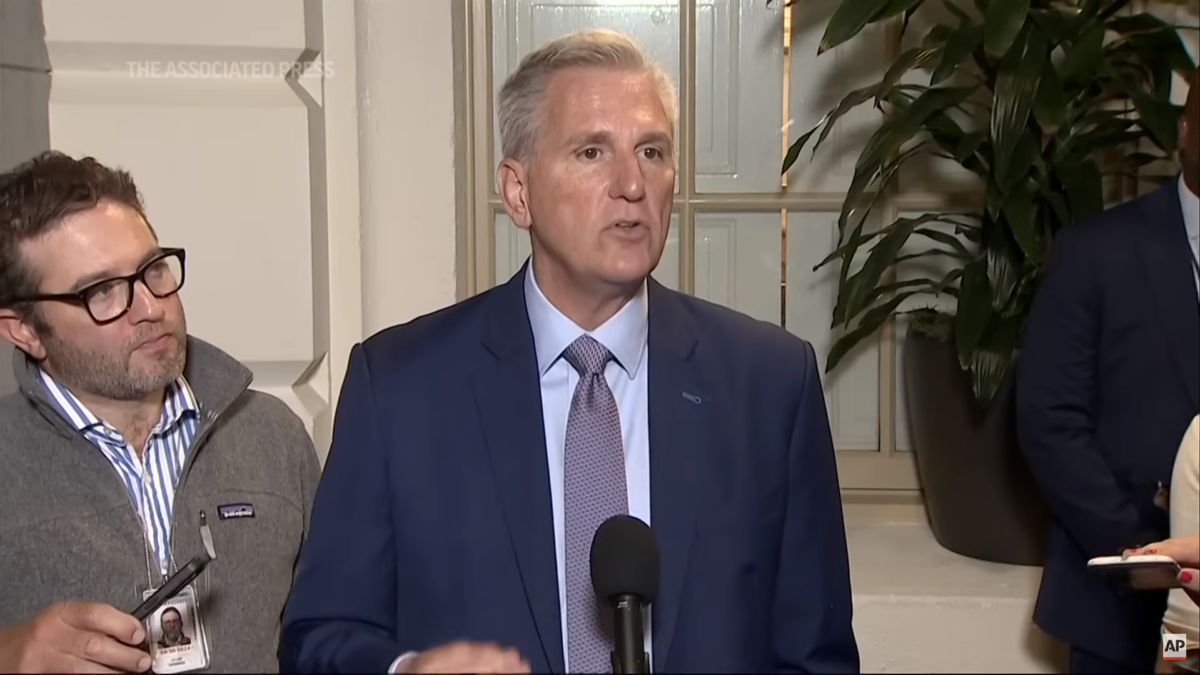
Numerous news reports indicate that budget conferees in Washington are planning to gut budget caps set in 2011, and Paul Ryan appears to be on board with the strategy. A final deal between conferees, led by Democratic Sen. Patty Murray and Republican Rep. Paul Ryan — chairmen of their chambers’ respective budget-writing committees — could come as early as today.
Congressional Republicans should reject the reported deal and require Congress to abide by the discretionary spending limits set by the bipartisan Budget Control Act (BCA), which was supported by over 70 percent of House Republicans and signed into law by President Barack Obama in 2011.
According to news reports and conversations with congressional staffers familiar with the ongoing talks, the Murray/Ryan plan currently under discussion would increase the discretionary spending limits for fiscal years 2014 and 2015 by nearly $70 billion. The 2014 and 2015 limits would be set in the neighborhood of $1.015 trillion, a $48 billion increase over the current 2014 cap of $967 billion and a $20 billion increase over the current 2015 cap of $995 billion. Congressional Democrats had initially demanded $1.058 trillion in 2014 spending, an amount that would’ve matched 2014 spending if sequestration didn’t exist.
One staffer told me that the Murray/Ryan plan would basically strike the existing 2014/2015 levels in the BCA and replace them with the new levels in order to prevent mandatory sequestration from taking effect.
In order to address charges that the plan unnecessarily increases spending, conferees will include a number of long-term offsets totaling $90 billion. The offsets would be a mix of small-time spending cuts combined with increases in federal user fees. Although the BCA currently sunsets the discretionary spending caps and enforcement mechanisms (like sequestration) in 2021, the Murray/Ryan plan will likely add fiscal years 2022 and 2023 to the mix. Much of the alleged savings to offset the new spending will occur in those years. That move will allow them to claim that while the plan significantly increases spending today, it will eventually offset it with lower spending and higher fees tomorrow.
Republican lawmakers should not fall for this nonsense. Why? For starters, because the people swearing to uphold new caps ten years from now are the same ones eviscerating the caps they agreed to barely two years ago. If they can’t be trusted to keep short-term promises, why on earth should they be trusted to keep long-term ones? A great way to show you won’t be trustworthy tomorrow is to break your word today.
Another reason to reject the Murray/Ryan deal is that it is both bad politics and bad policy. Democrats have been trying for some time to undo sequestration, which suggests that unraveling it is one of their top priorities. Under no circumstances should Republicans unravel it for them without getting anything meaningful in return. Yet that appears to be precisely what Republicans are allowing to happen.
Ryan and House GOP leaders could have demanded something truly meaningful in exchange for undoing sequestration: an equivalent delay in the implementation and enforcement of Obamacare. The law is clearly untenable and Democrats are desperate to free its albatross from their necks heading into the 2014 elections. An Obamacare-for-sequestration hostage exchange would’ve given each side something it wanted, and the “give” from each side would have been roughly equal. Unfortunately, GOP leaders appear constitutionally incapable of spotting a good deal, let alone crafting one themselves. The complete (and continuing) negotiating ineptitude of House Republican leaders is one reason why I previously called for them to resign.
But it’s not just the politics of this deal that are terrible — the policy is terrible as well. A diet that allowed you to scarf down Twinkies and fried chicken today as long as you promised to drink a Diet Coke instead of a real Coke tomorrow would be a joke. Unfortunately, that kind of spending diet is exactly what’s being discussed by Republicans who should know better. They want to take a breather today, but they totally promise to hit the treadmill in 2023. For reals this time.
As much as Republican appropriators hate to admit it, the enactment of mandatory sequestration was a rare Republican policy victory. It is one of the few substantive things Republicans have done to control spending in years. There’s simply no good reason to throw it all away only a few years after achieving it, especially when you consider that Republicans are not really getting anything in return.
Now, Ryan and his GOP leadership allies will likely offer three defenses of the strategy underlying the Murray/Ryan plan: 1) over the next ten years, it will save more money than what the BCA currently requires, 2) Republicans lack the votes on the budget conference committee to push through a better plan, and 3) if this plan isn’t agreed to, a bunch of liberal Republicans and their appropriator friends who hate sequestration will bolt and side with whatever plan Murray decides to shove down the House’s throat.
As I’ve already noted, the first defense is just laughably bad spin. The next two defenses, which are a variant of the time-honored “It would’ve been much worse had we not decided to sell you out” genre of spin, are similarly unconvincing.
Of those last two, the first — that Republicans simply lacked the votes on the conference to do anything — is actually an indictment of GOP leadership rather than a defense. Remember that Senate Majority Leader Harry Reid had gone for years without pushing the Senate to pass a budget. It wasn’t until House GOP leadership pushed for a law tying passage of a budget to congressional paychecks that Reid showed any inclination to move forward on a budget resolution. The “No Budget, No Pay” gambit initiated by Boehner in January of 2013 would have prohibited lawmakers from receiving their paychecks in the absence of a budget resolution. If not for that move, which completely eliminated a perfectly good GOP talking point without producing a similarly beneficial policy outcome for Republicans, there would be no Democrat-controlled budget conference threatening to cram a terrible budget deal down Republicans’ throats. Boehner traded away a great rhetorical asset in exchange for a policy framework in which his side would be completely outnumbered.
However, let’s grant the “We’re outnumbered on conference” defense so that we might move on to the final “We don’t have the votes to stop a bad deal in the House” defense. For the moment, we’ll ignore the fact that at no point over the last year have John Boehner, Eric Cantor, and Kevin McCarthy demonstrated any sort of proficiency at counting votes. The debacle over the shutdown only two months ago is a perfect example. Take a look at the ever-changing vote predictions from leadership highlighted in the Twitter excerpts here to get a flavor. When this crew declares that it absolutely does or doesn’t have the necessary votes, I simply don’t trust the proclamation, because recent history suggests these guys have no clue what they’re talking about when it comes to counting votes.
But let’s partially grant this defense. Is it actually a defense? Hardly. Again, it’s an indictment of House GOP leaders rather than a defense of their current strategy. If Boehner, Cantor, McCarthy, and Ryan are incapable of rounding up enough votes to preserve a budget-cutting deal they all supported in 2011, then what good are they? Why should they retain their leadership positions if they completely lack the ability to convince the conference to follow their lead? If they can only pass legislation opposed by a majority of Republicans, then they don’t deserve the privilege of calling themselves Republican leaders.
If the reported details about the Murray/Ryan plan are true, then Republicans should reject it entirely without a second thought. It busts the budget, guts sequestration, and fails to give Republicans anything meaningful in return for major budget concessions to D.C. Democrats. Despite the GOP leadership spin that you are sure to hear and read in the coming days, there are no good reasons to support what’s currently being floated in the media. And if House GOP leaders push ahead with it anyway against the will of a majority of elected Republicans, then those leaders should be rejected and replaced with Republicans who understand what true leadership looks like.









